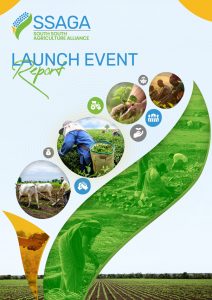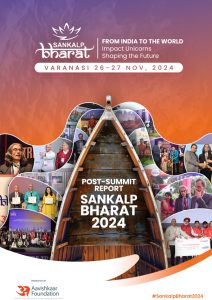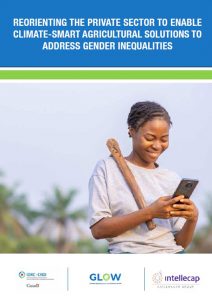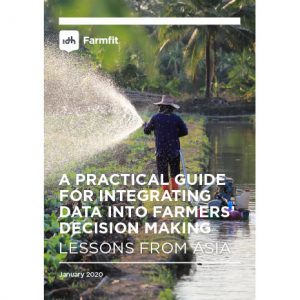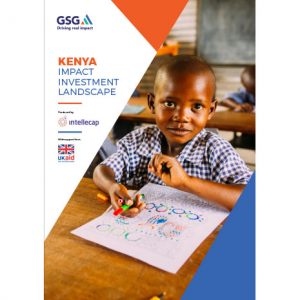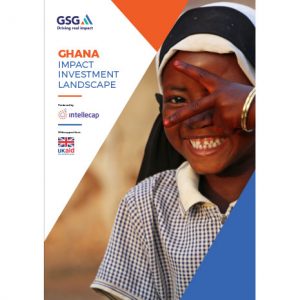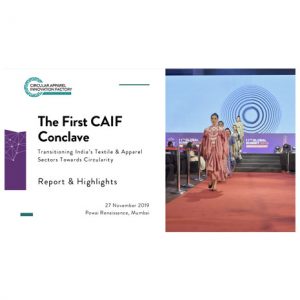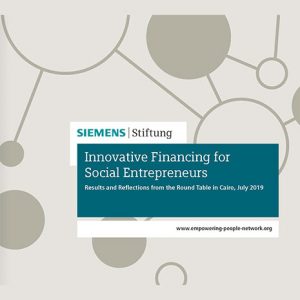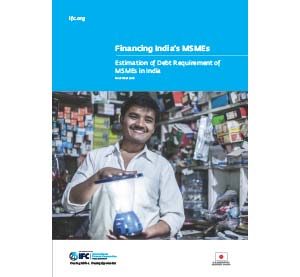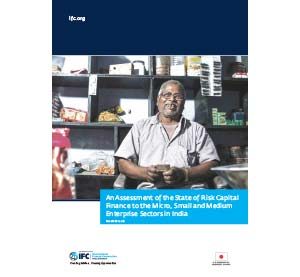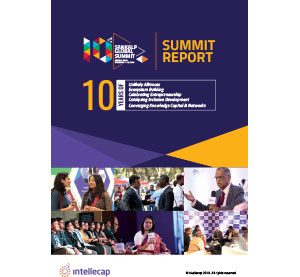TRENDING
-
SSAGA – Benefitting small-scale farmers by fostering innovations and collaboration across the Global South
Published: March, 2025 -
Sankalp Bharat 2024-Post Summit Report
Published: March, 2025 -
Reorienting The Private Sector To Enable Climate-smart Agricultural Solutions To Address Gender Inequalities
Published: February, 2025
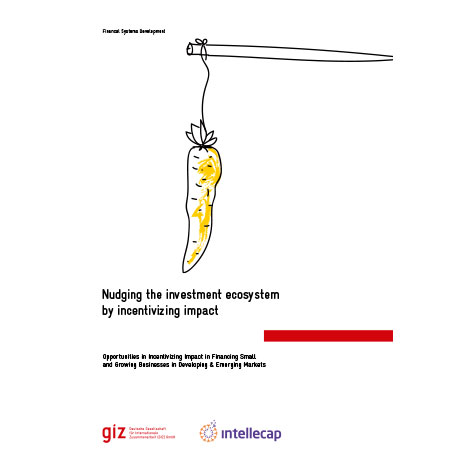
Nudging The Investment Ecosystem By Incentivizing Impact
PUBLISHED: June, 2018
Opportunities in Incentivizing Impact in Financing Small and Growing Businesses in Developing & Emerging Markets
This paper is a summary of fresh ideas on how to channel more capital into impact investing and incentivize impact creation. Building on insights generated by experts at the BMZ hosted conference Financing Global Development – Leveraging Impact Investing for the SDGs, the paper furthers the conversation on Impact Measurement and Management, IMM 2.0, through brainstorming practical ideas and viewpoints in the impact investing value chain: those who provide capital, those who manage it, and those who receive it. This included close to 50 stakeholders, including fund managers, DFIs, intermediaries, entrepreneurs, governments, CSOs and others.
The discussion, conducted in the form of a ‘design lab’ by Deutsche Gesellschaft für Internationale Zusammenarbeit (GIZ) GmbH, Intellecap, and the Swiss Agency for Development and Cooperation (SDC), aims to start a conversation on how to maximize impact by channeling capital into small and growing businesses (SGBs) as a way to expedite achievement of SDGs (Sustainable Development Goals). During the session, industry leaders like FMO, Vox Capital, and Roots of Impact had shared case studies of good practices in incentivizing impact along the investment chain. This formed the basis of brainstorming on development of new ideas on innovative instruments that could nudge the ecosystem towards more actively pursuing and scaling impact.
The result is an analysis of the barriers in the impact investment value chain highlighted during the stakeholder conversations, and key insights on how to overcome them (for example, the need for transparency, standardization, leadership, etc.). In addition, the workshop collated a list of potential ‘wild ideas’ to like impact currency, impact rewards, impact index, online market places for impact auctioning, and a give-back distribution impact support system, designed to incentivize increased levels of investment along the value chain. The practical approaches suggested by stakeholders fit well with the existing impact measurement and monitoring frameworks like GIIN’s IRIS and Intellecap’s PRISM and hold the potential to guide impact capital more efficiently by leveraging good practices.

The Financial Lives of Government Employees – Potential of Digital Finance in Sierra Leone
PUBLISHED: July, 2018
This report documents findings from research on the financial lives of government employees in Sierra Leone, commissioned by the Government to People Payments Project – Building Digital Ecosystem funded by USAID. Intellecap supported UNCDF, Government of Sierra Leone and Bank of Sierra Leone for conducting the research.
There are 80,000 government employees in Sierra Leone who receive salaries digitally in their bank accounts. Insights about their financial lives can help build a viable business case for DFS to expand access to a wide range of financial services for underserved communities in Sierra Leone. Such insights can inform strategies and use cases that the UNCDF and the Government of Sierra Leone can develop to promote DFS in the country. The National Strategy for Financial Inclusion 2017 – 2020 also refers to the need to identify and digitize use cases that will lead to habitual usage, and achieve Sierra Leone’s commitments to the ‘Better Than Cash Alliance’.
Recognizing the need and opportunity, UNCDF supported the Financial Lives Survey of government employees who receive their salaries digitally in Sierra Leone. Intellecap designed the survey to understand how government employees utilize salaries transferred into their bank accounts, their awareness of and access to DFS, avenues to use them and their perceptions about financial services and digital financial transactions. This report contains insights from the survey about potential customers of DFS and recommendations on use cases that could be piloted as an initial step to improve DFS adoption in Sierra Leone.
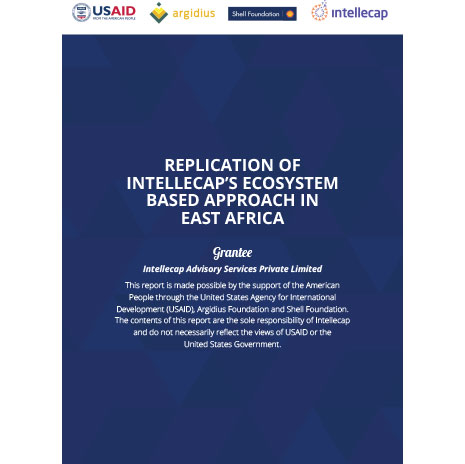
Replication of Intellecap’s Ecosystem Based Approach in East Africa
PUBLISHED: July, 2018
Intellecap has sought to replicate its ecosystem-based approach to East Africa by bringing
together capital, knowledge and networks to support SGBs at two levels: (i) provide direct support
to SGBs in the form of acceleration, fund-raising, technical assistance, innovation transfer, and
market linkages, and (ii) discover and engage critical ecosystem players such as corporations
(both local and international), accelerators, other development sector players in supporting SGBs.
In the three-year period since the launch of our initiative to replicate our ecosystem-based
approach for accelerating entrepreneurship support to SGBs in East Africa, we have received
generous support not only from our funders, but also from a number of local and international stakeholders such as development institutions, private sector entities, and industry associations.
Over the last year, we have replicated our advocacy platform (Sankalp), angel investment network
(I3N) advisory services (consulting & investment banking), virtual incubation platform
(StartupWave) and impact measurement platform (PRISM) as envisaged at the beginning of our
programmatic support. The development and adaptation of StartupWave for East Africa has
resulted in over 450 sign-ups for our early stage enterprise support activities and partnerships with
over 30 incubators / accelerators. Similarly, PRISM, our impact measurement platform, has
garnered interest from a wide variety of players to measure the impact of their programs.
All Publications
-
A Practical Guide for Integrating Data into Farmers’ Decision-Making Lessons from Asia
PUBLISHED: March, 2020READ MORE -
Mid-Term Evaluation of WFP School-Feeding USDA Mc Govern Dole Grant for FY 2017-2020 in Bangladesh (2019-20)
PUBLISHED: February, 2020READ MORE -
Siemens Stiftung – REPORT on Round Table on “Innovative Financing for Social Entrepreneurs”, Cairo 2019
PUBLISHED: October, 2019READ MORE -
Convene. Connect. Catalyze. | Insights from the Sankalp Africa Summit 2019
PUBLISHED: September, 2019READ MORE -
Financing India’s MSMEs – Estimation of Debt Requirement of MSMEs in India
PUBLISHED: April, 2019READ MORE
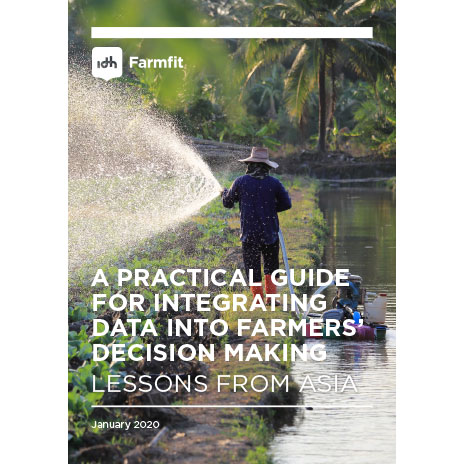
A Practical Guide for Integrating Data into Farmers’ Decision-Making Lessons from Asia
PUBLISHED: March, 2020
The benefits of data integration in agriculture/aquaculture greatly outweigh the costs associated with it, however, influencing smallholder farmers to adopt data-driven technologies continues to remain a critical challenge. Since most farmers in developing economies are smallholders, low adoption is a result of underlying factors such as a limited ability and willingness to pay, poor receptivity of new technology, lack of trust and awareness, and an outlook for immediate gains. The difficulty of last-mile connectivity further amplifies the adoption challenge. As a result, only a few businesses have managed to scale while others still struggle with financial-sustainability. The ones that have scaled have incorporated strategies involving pricing, marketing, and distribution; an understanding of which is necessary for successful participation in this space.
With this background, IDH, with support from Intellecap, developed this practical guide for organizations seeking to integrate data into agriculture/aquaculture through Farm Management Information Systems (FMIS) in emerging economies. The recommendations included in the guide are an outcome of secondary research on 128 FMIS service providers and a deep dive with 21 shortlisted FMIS service providers operating in five countries of Asia: China, India, Indonesia, Thailand, and Vietnam1.

Mid-Term Evaluation of WFP School-Feeding USDA Mc Govern Dole Grant for FY 2017-2020 in Bangladesh (2019-20)
PUBLISHED: February, 2020
Mid-Term Evaluation of WFP School-Feeding USDA Mc Govern Dole Grant for FY 2017-2020 in Bangladesh (2019-20)
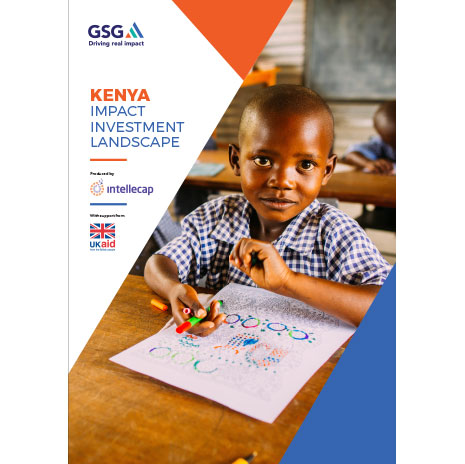
KENYA Impact Investment Landscape
PUBLISHED: January, 2020
About Impact Investment and The Impact Economy
To navigate the complexity of achieving a future where no one lives in poverty and the planet thrives, we need a simple unifying principle: that it is the role of all actors in society to examine how their actions affect the people and the planet.
Impact investment optimizes risk, return and impact to benefit people and the planet, by setting specific social and environmental objectives alongside financial ones, and measuring their achievement. Impact management is a critical practice to reach this potential.
As more people and organizations get involved and become more successful in impact investing, there is a cumulative effect. A vibrant and growing impact economy can develop where businesses, investment and activity deliver tangible improvements in outcomes for people and the planet and people have choices. In the impact economy, businesses use their capabilities to optimize both their positive impact on the world and their financial return. Investors use their resources to optimize business impact, adding and creating value beyond what would otherwise be achieved. The momentum of more positive impact being generated enlivens the possibility of an inspiring future.
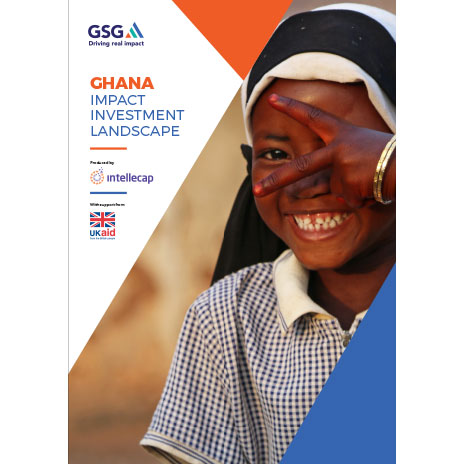
GHANA IMPACT INVESTMENT LANDSCAPE
PUBLISHED: January, 2020
About Impact Investment and The Impact Economy
To navigate the complexity of achieving a future where no one lives in poverty and the planet thrives, we need a simple unifying principle: that it is the role of all actors in society to examine how their actions affect the people and the planet.
Impact investment optimizes risk, return and impact to benefit people and the planet, by setting specific social and environmental objectives alongside financial ones, and measuring their achievement. Impact management is a critical practice to reach this potential.
As more people and organizations get involved and become more successful in impact investing, there is a cumulative effect. A vibrant and growing impact economy can develop where businesses, investment and activity deliver tangible improvements in outcomes for people and the planet and people have choices. In the impact economy, businesses use their capabilities to optimize both their positive impact on the world and their financial return. Investors use their resources to optimize business impact, adding and creating value beyond what would otherwise be achieved. The momentum of more positive impact being generated enlivens the possibility of an inspiring future.
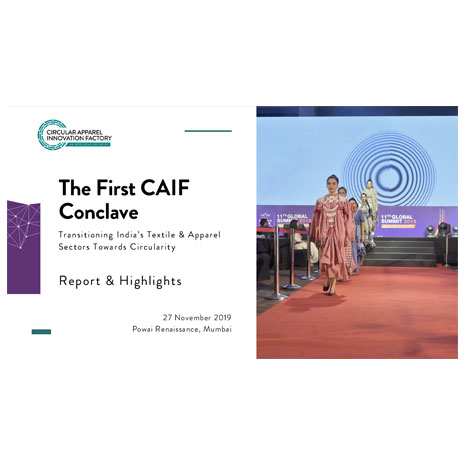
First Circular Apparel Innovation Factory Report 2019
PUBLISHED: December, 2019
The 1st Circular Apparel Innovation Factory Report is a compilation of all that happened at the 1st CAIF Conclave 2019 that was hosted at the Sankalp Global Summit 2019 in Mumbai. The Conclave saw key conversations around Circular Economy and Sustainable fashion that was tabled at the launch of CAIF. The Comcalev had many parts that came together. Leaders from the Industry shared their perspectives, a fashion grand bazaar was created that showcased innovators, a workshop for out of the box ideas was conducted on the circular economy and a fashion show that highlighted social enterprises making sustainable fashion happen. To top it all over 60 partners joined us at the 1st CAIF Conclave. Intellecap with Anchor Partners Aditya Birla Fashion and Retail (ABFRL) and The DOEN Foundation played a key role at the conclave. Together at the summit they launched the Circular Apparel Innovation Factory (CAIF), an industry-led platform with the mission to build the capabilities and the ecosystem needed to transition towards a circular textile and apparel industry in South Asia. The conclave was India ‘ s first convening of circular apparel and textile professionals aligning on building a common vision and roadmap for the transition towards circularity.
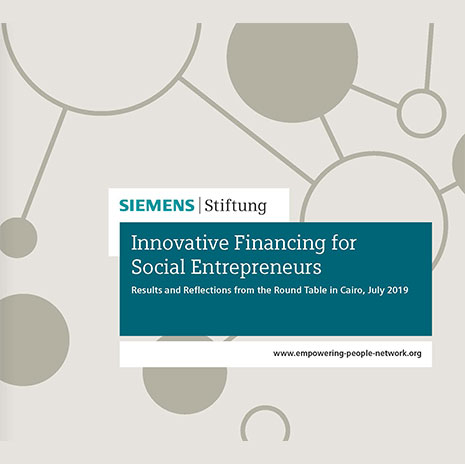
Siemens Stiftung – REPORT on Round Table on “Innovative Financing for Social Entrepreneurs”, Cairo 2019
PUBLISHED: October, 2019
We are excited to share Siemens Stiftung’s new report on Innovative Financing for Social Entrepreneurs. In July 2019, Intellecap Investment banking Group’s head Gagandeep Bakshi joined fellow industry experts at the Empowering People Award at the epRoundtable in Cairo. Some very tangible solutions came from discussions and this report offers new insights and paths for social entrepreneurs when it comes to finding the “right” financing fit for their work.
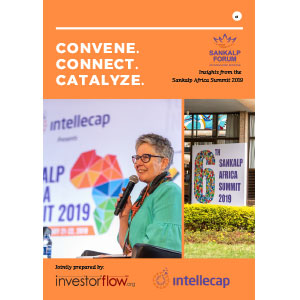
Convene. Connect. Catalyze. | Insights from the Sankalp Africa Summit 2019
PUBLISHED: September, 2019
The Sankalp Africa Summit has grown to be the largest convening of ts type in the region. The 2019 edition drew 1,000+ people of 40 ationalities from the Americas, Europe, Asia, Australia, and Africa. takeholders are incredibly diverse, representing entrepreneurs, nvestors, philanthropists, academic institutions, entrepreneur support rganizations, and DFIs – furthermore, they represent every impact ector.
Having hosted 20 Sankalps globally, the organizers wanted to gather ore insights on the attendees of Sankalp, why they attend, and what hey are looking for. Much research has been done on the impact nvesting space in East Africa, however, we have access to one of the ost exhaustive data sets in existence – the Sankalp Forum attendees hemselves. In order to achieve this, we partnered ith investorflow.orgwho has collected similar data from the investors on their platform and ho was instrumental in collecting and analyzing the data we collected.
We have assembled this report to share some of these insights with the broader entrepreneurship ecosystem. We hope you find it helpful!
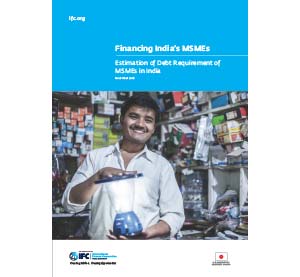
Financing India’s MSMEs – Estimation of Debt Requirement of MSMEs in India
PUBLISHED: April, 2019
This study aims to provide an assessment of the Micro, Small and Medium Enterprise sector finance in India. The chapters in the study highlight the key characteristics of the MSME sector, and assess the demand for, and the flow of credit into the sector. The study also evaluates the consequent gap in the financing needs of MSMEs. Finally, it explores potential interventions to boost the flow of formal credit to the sector. This study is an update to IFC’s ‘Assessment of MSME Finance in India” Report which was earlier published in Nov, 2012. (This Report is based on research and analysis of available demand and supply data from 2017).
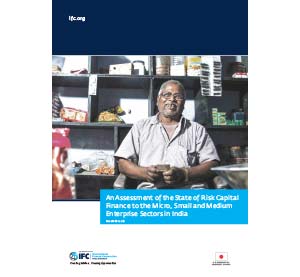
Assessment of State of Risk Finance for MSMEs in India
PUBLISHED: April, 2019
This study aims to assess the state of risk capital finance to the MSME sector in India. It focuses on analyzing the forms, sources and availability of risk capital products, such as equity, venture debt and unsecured debt to the sector. It estimates the gap in the demand and supply of risk capital to the sector, with a focus on equity capital (in the form of private equity, venture capital and angel investments). It also assesses the relevant enabling environment and supporting policy infrastructure, and in conclusion, provides recommendations and potential interventions to mitigate the demand-supply gap in MSME risk capital financing. (This Report is based on analysis of research and available demand and supply data from 2017).
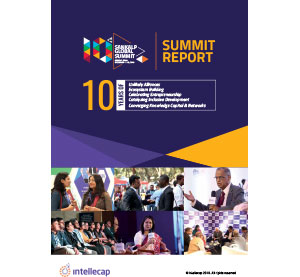
Sankalp Global Summit 2018 | Post Event Report
PUBLISHED: April, 2019
In 2018, Sankalp celebrated 10 years of building entrepreneurial ecosystems across the world for business led inclusive development. 2018 was a year to celebrate and showcase entrepreneurs that have proven the long-standing narrative that businesses can have a demonstrated impact on some of the key challenges that the world faces and remain profitable and sustainable. The agenda for the two days of the Summit were curated around the needs of entrepreneurs; building on the Aavishkaar-Intellecap’s group mission to foster an ecosystem of knowledge, capital & networks to help scale enterprises.
We deep dived in to five thematic knowledge areas of financial inclusion, clean energy & climate change, agriculture, WASH & gender. Some of the unique aspects of this year’s summit were the diverse participation – in particular from mainstream private sector and financial inclusion in the region. Mainstreaming the development agenda to be more inclusive has been a priority across our work and it has been demonstrated through the speakers, participants and the outcomes of the summit.
Reflecting on the last ten years, progress in this space and impact can be seen by the growth of enterprises. Our opening plenary showcased four such dynamic enterprises that have become multi million dollar companies, impacting millions of people in underserved areas. The Summit Outcome report highlights key insights from the 40+ discussions, conversations with our participants, and the summit’s outcomes. We can achieve the Sustainable Development Goals by 2030 through business and we hope you will continue with us on Sankalp’s journey of building a thriving ecosystem to support this.
Reports & Policies
Our Impact Map

Sign up for our newsletter
© Copyright 2018 Intellecap Advisory Services Pvt. Ltd. - All Rights Reserved



